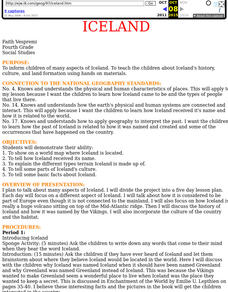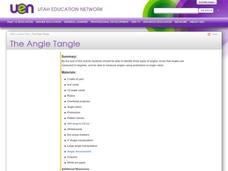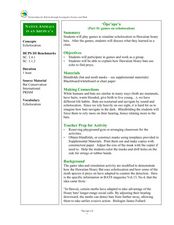Curated OER
Meet the Tiger
Here is an excellent lesson tigers that has a research component. Integrated into the lesson is the premise that God created animals and the human responsibility to care for them. At learning centers students visit various Websites and...
Curated OER
Iceland
Fourth graders discover the country of Iceland. They investigate Iceland's history, culture, and geography using hands-on materials. They engage in a multi-day lesson. Each day focuses on a different aspect of Iceland. A most-impressive...
Curated OER
Wonderful Wetlands
Fifth graders describe a wetland habitat and its components. They provide, in writing, at least one example of a wetland food chain, relate wetlands to ecological functions, and relate the importance of wetland functions to their own...
Curated OER
Brain Awareness Week Lessons
Students explore the human brain and nervous system. In this brain awareness lesson, students examine specific terms with regards to the human brain. Students discover the brain's structure and function and how it functions as the body's...
Curated OER
Designing an Underwater Habitat for Humans
Students consider the limitations of deep water oceanography and design an underwater habitat to support scientists while they complete long term studies under the ocean. In this engineering activity, students are introduced to the...
Curated OER
Angles
Fourth and fifth graders investigate angles and name them according to the criteria for obtuse, acute, and right angles. They examine a human-made yarn pattern on the floor of their classroom and identify angles, vertices, and types of...
Curated OER
Games on Echolocation
Get a little batty with life science! This fun simulation game replicates how bats use echolocation to hunt moths in their native Hawaiian habitat. After creating blind folds and discussing some basic principles of echolocation, students...
Curated OER
The Mind-Body Connection
Second graders learn about the human body. In this biology lesson plan, 2nd graders will begin with the basics of understanding charts and graphs and progress into units that cover the body systems, and mental and emotional health....
Curated OER
Food Security/Insecurity
Students gain awareness of global patterns of food distribution. They are introduced to the concepts of food security and food insecurity. Pupils investigate the nutritional status of others around the world using information from the...
Curated OER
Using High Stakes Testing to Make Students and Schools Accountable for Learning
Students conduct an informal survey about their views on high stakes testing and use basic computation skills to evaluate results as a group. They participate in activities related to high stakes testing and "No Child Left Behind"...
National Wildlife Federation
What's Your Habitat?
How are third graders like rabbits? They both live in habitats and require food, water, and shelter to survive! An educational science lesson encourages your learners to think about their own habitats and survival needs, before comparing...
Outdoor Learning Center
Outdoor Survival
Which of the following can you survive without for the longest time: water, food, or a positive mental attitude? The answer may surprise you. Guide learners of all ages through games, activities, and discussions about surviving in the...
Curated OER
Outdoor Survival
Students are introduced to basic outdoor survival concepts. They identify the seven basic needs for survival. Students describe the symptoms and treatment for frostbite and hypothermia. They compare and contrast the value of different...
University of Minnesota
Connect the Neurons!
Create a neuron frenzy as your pupils play the part of the neurons. An engaging lesson creates a human chain of neurons that pass cotton balls posing as neurotransmitters. Scholars learn about pre- and post-synapses as they complete the...
Curated OER
Journey to Japan: An Elementary Geography Standards-Based Unit on Japan
Second graders compare and contrast Japanese customs and culture to those of Americans through research in this year long study. They determine the basic needs of all people in spite of cultural differences.
Curated OER
Natural Resources and Ancient Cities
Students explain how the availability of natural resources has affected human settlement patterns. They recognize the interactions of human populations on environments and compare the growth of two ancient cities in relation to natural...
Curated OER
Systems of the Body: Movement and Choreography
Young scholars create movements that connect art and science. In this body systems lesson, students interpret the function of body systems, organs, and processes as they create movements to exhibit their research findings.
Curated OER
The Struggle for Human Rights
Tenth graders identify and clarify a problem, an issue, or an inquiry. They identify the changing nature of families and women's roles in Canadian society. Pupils assess the interaction between Aboriginal people and Europeans. ...
Curated OER
Motivation
In this psychology review instructional activity, students complete 5 short answer questions on human motivation, homosexuality and Maslow's Theory.
Global Oneness Project
Far From Home
A timely and provocative lesson inspires high schoolers to tackle the Syrian refugee crisis. They analyze a compelling photo essay before discussing and writing about it.
Curated OER
Touch and Abstinence
FLASH has put together another good lesson about touch and abstinence. Humans need human touch, yet many confuse this need for touch, and their desire for sex. Discuss the four types of touch with your health or teen issues class. There...
Curated OER
Extracting DNA from Your Cells
Three steps are needed to extract DNA from learners' inner cheek cells. The procedure and reasons for each step are explained. As enzymes work on the cells, a series of questions are answered regarding the structure of the DNA molecule....
Curated OER
The Environment
Students explore the issues that influence our environment and research ways to decrease the negative impact that humans have on the environment. Misconceptions about environmental issues are addressed in this lesson.
Curated OER
You Have Egg On Your Face
Students explore and analyze how the human face is proportioned and explore ways artists use mathematics to make art. They demonstrate the basic face proportions by creating a reference sketch and illustrating visual clues to communicate...

























